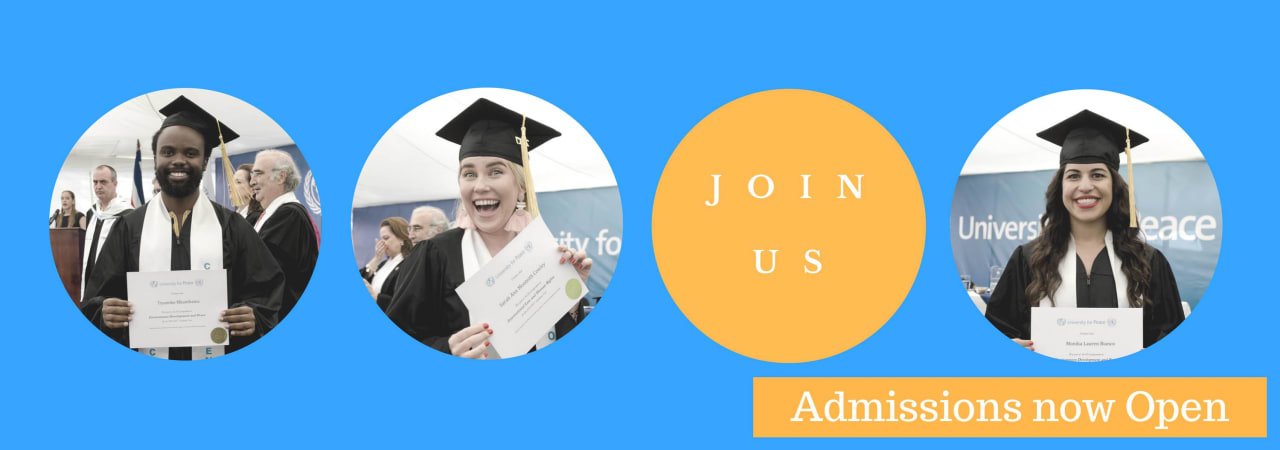
University for Peace

Introduction
The University for Peace (UPEACE) is an institution of higher education dedicated to the study of peace.
Created by UN General Assembly Resolution 35/55, the University for Peace has been training leaders for peace since 1980. It is a unique global academic institution with over 2,000 Alumni hailing from more than 120 nations. Through its Master’s and Doctoral degree programmes, UPEACE trains future leaders to explore and formulate strategies and practices in various contexts to address the causes of multiple problems affecting human and global wellbeing, and thus contribute to the processes of peacekeeping and peacebuilding. The UPEACE Experience is experiential and unique, empowering, transformative and cultivates critical thinking in its students.
The vision of the University for Peace is to be a forward-thinking, transformational and inspirational educational institution dedicated to the goals of quality teaching, research, and service for serving humanity in building a peaceful world.
Established as a Treaty Organization with its own Charter in an International Agreement adopted by the General Assembly in Resolution 35/55 of 5 December 1980, the University for Peace has the following mission:
"to provide humanity with an international institution of higher education for peace and with the aim of promoting, among all human beings, the spirit of understanding, tolerance and peaceful coexistence, to stimulate cooperation among peoples and to help lessen obstacles and threats to world peace and progress, in keeping with the noble aspirations proclaimed in the Charter of the United Nations".
The Charter of the University sets out in its appendix the following general principles:
- The persistence of war in the history of mankind and the growing threats against peace in recent decades jeopardize the very existence of the human race and make it imperative that peace should no longer be viewed as a negative concept, as the end of conflict or as a simple diplomatic compromise, but rather that it should be achieved and ensured through the most valuable and most effective resource that man possesses: education.
- Peace is the primary and irrevocable obligation of a nation and the fundamental objective of the United Nations; it is the reason for its existence. However, the best tool for achieving this supreme good for humankind, namely education, has not been used.
- Many nations and international organizations have attempted to attain peace through disarmament. This effort must be continued, yet facts show that man should not be too optimistic as long as the human mind has not been imbued with the notion of peace from an early age. It is necessary to break the vicious circle of struggling for peace without an educational foundation.
- This is the challenge that now faces all nations and all men, as the twenty-first century approaches. The decision must be made to save the human race, which is threatened by war, through education for peace. If education has been the instrument of science and technology, there is all the more reason to use it to achieve this primary right of the human being.
UPEACE History
Costa Rica abolished the death penalty in 1882, and its army in 1948. Since 1865, Costa Rica has offered asylum to those facing persecution for political reasons. From 1907 to 1918, Costa Rica hosted the Central American Court of Justice, which was the first permanent international tribunal that allowed individuals to take legal action against states on international law and human rights issues. In that tradition, efforts to establish the University for Peace began at the United Nations under the leadership of the President of Costa Rica, Rodrigo Carazo. On the 5th of December, 1980, the General Assembly of the United Nations adopted resolution 35/55 which sets out in its annex the International Agreement for the Establishment of the University for Peace. The Charter of the University forms part of that agreement.
As part of the continuing process of United Nations reform, former UN Secretary-General Annan took a number of measures since early 1999 to reorganize, strengthen and internationalize more fully the University for Peace - so as to enable it to contribute more effectively to the peace and security objectives of the United Nations.
The Council has defined an innovative programme of education, training and research for peace - focused on key issues, including conflict-prevention, human security, human rights, environmental security, and post-conflict rehabilitation.
Gallery
Programs
- MA in Development Studies and Diplomacy (Hybrid & Online Formats) (UNITAR)
- MA in Environment, Development, and Peace
- MA in Environment, Development, and Peace with Specialization in Climate Change
- MA in Environment, Development, and Peace with Specialization in Environmental Security and Governance
- MA in Environment, Development, and Peace with Specialization in Sustainable Food Systems
- MA in Environment, Development, and Peace with Specialization in Sustainable Natural Resource Management
- MA in Gender and Peacebuilding
- MA in Indigenous Science and Peace Studies
- MA in International Law and Diplomacy (Hybrid & Online Formats) (UNITAR)
- MA in International Law and Human Rights
- MA in International Law and the Settlement of Disputes
- MA in International Peace Studies
- MA in International Peace Studies with Specialization in Media, Peace and Conflict Studies
- MA in Peace Education
- MA in Religion, Culture and Peace Studies
- MA in Responsible Management and Sustainable Economic Development
- MA in Sustainable Peace in the Contemporary World (Online)
- MSc in Ecology and Society
- Master in Conflict Resolution, Peace and Development

